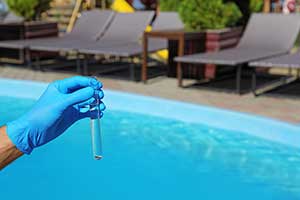
Are you a commercial pool owner looking to keep your guests safe and healthy? If so, you need to be aware of the dangers that could lurk in the water – even when it looks sparkling clean. Let’s discuss some of the most common pool germs, bacteria, and diseases. We’ll also provide tips for preventing these contaminants from spreading.
Poor Guest Hygiene Can Be A Pool Manager’s Worst Nightmare
Despite your best efforts at keeping your pool clean and chemically balanced, you can’t always control what your patrons do. Not everyone showers before wading in, even when you post the requirement. Fecal matter from leaking swim diapers or from visitors who lie about their recent diarrhea can introduce all kinds of dangerous germs. And it’s not just hygiene that you need to worry about. Your pool maintenance staff could fail to do their job correctly, leading to incorrect chemical levels that allow bacteria to flourish.
What Could Be Lurking In Your Pool Water?
Many dangerous bacteria and germs can live in community pools and hot tubs. Therefore, it is imperative to have your water regularly tested to ensure that it is safe for swimming. Some of the most common dangerous pathogens found in public water sources include:
- E. coli. You probably know that E. coli can be spread via undercooked beef and other food sources. Did you know that it can also be ingested via contaminated pool water?
- Shigella. This bacteria causes similar symptoms to E. coli, including fever, cramps, and (often bloody) diarrhea.
- Pseudomonas aeruginosa. You may not have heard of this bacteria, which can survive in chlorinated pools via biofilm. It causes many health issues, including skin and ear infections and respiratory problems.
- Cryptosporidium. This is a microscopic parasite that causes a diarrheal infection.
- Giardia. Another water-borne parasite, giardia can cause an intestinal infection with watery diarrhea, cramps, nausea, and bloating.
- Legionella. This bacteria is linked to a dangerous, sometimes fatal type of pneumonia sometimes called Legionnaire’s disease.
Keeping Water-Borne Pathogens Out Of The Pool
When it comes to water-borne illnesses, some of the worst offenders are chlorine resistant. This means they could be present even though your DIY tests indicate a proper balance of pool chemicals. So what can you do to keep your visitors and staff safe?
- Post visible signage outlining all hygiene rules.
- Ask all visitors to shower before entering the water.
- Require infants to wear correctly fitting swim diapers.
- Do not allow guests who have had diarrhea within the past two weeks to enter the water.
- Ensure the pool is cleaned regularly, including skimming, scrubbing the sidewalls and floor, and vacuuming.
- Regularly test the water and keep pool chemicals properly balanced.
- Schedule periodic pool water testing by an environmental consulting firm.
M3 Environmental Is Here To Help
Whether you have a hotel, motel, HOA pool, or other commercial water feature in the Monterey, CA area, M3 Environmental is ready to help identify any dangerous pathogens lurking in your water. Our methods can identify bacteria germs that your DIY testing omits. We can advise you on steps you need to take to get back in compliance with public health rules and keep your visitors safe and happy. After your cleanup is completed, we can also re-test to ensure your site is safe and hazard-free. Call us today to find out more.





